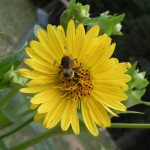
Bees forage on many plants. Create pollinator pockets to help them out. Then harvest the honey from your hives.
Interest in beekeeping is heading toward the stratosphere. Although the number of bee colonies may be declining more and more are showing up in suburban and urban yards.
We kept bees for years and enjoyed watching them visit garden flowers. Their honey was delicious. We didn’t stop beekeeping from lack of interest. It simply became a time priority. Bee colonies need attention in May and June, just when we like to wander off camping, go fishing, canoe the river, or work in our garden. Something had to go, and for us it was the bees. But, we still miss them and beekeeping may be your perfect hobby.
Here are beekeeping aspects to consider
- It is fascinating. Tend a hive and you may kindle a lifelong hobby.
- It’s complex. Keeping bees requires knowledge, time and strength. Having a mentor is the best way to learn, but many organizations now sponsor classes, and books, websites, and YouTube videos abound to help with the learning curve. University of Minnesota’s Extension Office has an excellent site on beekeeping basics.
- It can be costly. You’ll need hives, coveralls, veils, smokers, hive tools, a honey extractor and bees. Bees and equipment can be mail ordered and some stores sell them.
- Honey is heavy. Plan on hefty lifting.
- With the relatively recent arrival of several new parasites, diseases, and the still somewhat mysterious colony collapse syndrome, it’s getting harder to keep colonies alive and productive. Colony death is common.
- Home produced honey is delicious.
- Bees are outstanding pollinators and may make a garden more productive.
- Beekeeping is not allowed in some towns. Check local ordinances before jumping in.
A great way to start a bee hobby is to find an established beekeeper and volunteer to help. Working with a mentor is an opportunity to decide whether beekeeping is for you before investing in equipment and bees.
An Internet search will help locate a beekeeping class in your area. Simply type “beekeeping class in (your state)” into the search engine and chances are good you’ll find a class nearby. YouTube Videos aren’t as hands on as taking a class or working with a mentor but they are helpful. One of our favorites is a 25 part series on YouTube done by Dr. Keith Delaplane of the University of Georgia. We found it at FarmUS12 on YouTube.

